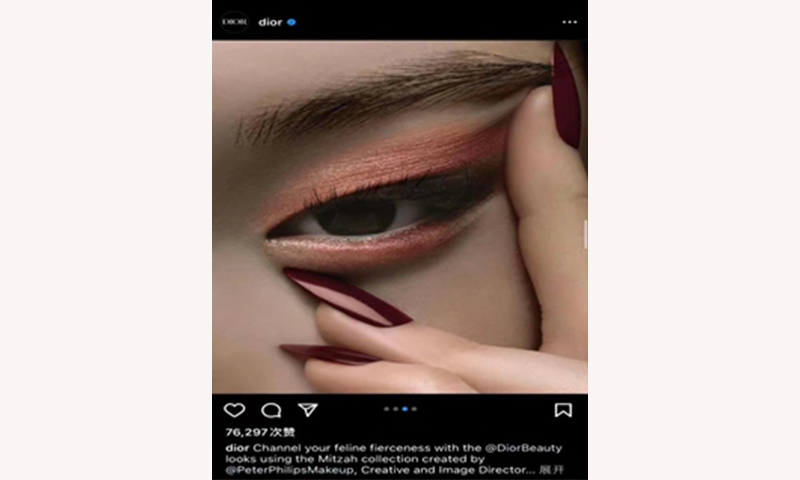French luxury brand Dior is once again embroiled in a racist controversy. In one of the company’s recently released makeup campaign photos, an Asian model is shown with two fingers stuck between her eyes and then pulling her eyes back. Internationally, especially in the US and European societies, this has always been seen as one of the representative racist gestures against Asians. Thus, the photo has been criticized by both Chinese and foreign netizens. In the face of the overwhelming criticism, Dior chose to delete the controversial photo from its official social media account quietly without any explanation. If the move is some kind of “public relations strategy,” then it’s quite stupid, cowardly and unsuccessful.
Many netizens commented that Dior is already a “recidivist” when it comes to racial discrimination. It has been in trouble many times before for displaying photos of Asian women with “slanting eyes” that appear strange and seductive. A few years after that, Dior released photos of models making the “slant-eye” gesture. When something like this happens again and again, it can no longer be said that this is an “inadvertent mistake” or “elementary mistake.” So far, the public has seen no signs of the luxury company learning from its mistakes to respect others. Instead, it seems to aggravate its behaviors. As a deliberate gesture, “pulling eyes back” is obviously rather subjectively malicious. It offends and hurts Chinese people, Asians and Asian communities living in Western societies.
Netizens’ criticism of Dior is legitimate. It’s not out of over-sensitivity. In fact, “pulling eyes back” is quite commonplace in American and European societies. It makes fun of the appearance of Asians, especially East Asians – Chinese, Japanese and Koreans – in Western culture. It has been widely criticized as racist, which has been reported by many mainstream media in the US and the West. There has also been much discussion on Quora, the world’s leading social question-and-answer website, with almost all responders agreeing that the discriminatory implications of this action are clear. One US columnist wrote, “For racists, imitating the shape of the eyes is meant to make fun of Asians as ‘outsiders’ or even ‘ugly.'”
There have been many controversies surrounding the “slant-eye” posture, and Dior should take a good look at how the parties involved have dealt with it. In 2017, Colombian footballer Edwin Cardona made a slant-eye gesture toward South Korean players, causing a huge uproar in South Korea. As a result, he was suspended for five matches by FIFA, and he publicly apologized to the Korean team. In 2018, a pair of US-based television hosts were indefinitely suspended for the same gesture, and both the TV station and the hosts publicly apologized. In 2019, Bahraini footballer Sayed Baqer caused a stir by making a slant-eye gesture toward Hong Kong supporters, and FIFA issued a heavy penalty, banning him for 10 matches and fining him £23,000 (around $28,669). In 2021 a Serbian volleyball player was banned for two games, and her federation fined 20,000 Swiss francs (around $22,328) in an FIVB Volleyball Women’s Nations League match against Thailand. And an apology was also issued.
From past cases, it is easy to see that there is no dispute over the interpretation of the “slant-eye” gesture. Even according to the “international practice,” it is not only reasonable but also a bottom line requirement for Dior to publicly apologize and punish those involved. East Asia, including China, is the largest source of Dior’s global revenue. If Dior truly respects the Asian market, it should have basic respect and humility, rather than trying to handle the “public relations crisis” with a “pretending-not-to-know” attitude repeatedly. This attitude not only fails to bring the “luxury feeling” that Dior wants to create but also exposes its numerous flaws, ultimately causing irreversible damage to its reputation.
It is worth noting that some Western media are clearly biased. When a company is embroiled in racial discrimination disputes within the US or Europe, they unhesitatingly stand on the side of “political correctness” and strongly condemn the discriminatory remarks and actions. However, once things involve Chinese society, they reflexively put the label of “nationalism” on China. There have been many such double standard cases in recent years, but the stir it can cause is getting smaller and smaller.
Regarding the “slant-eye” controversy, we hope that Dior can face up to its mistakes, make a sincere apology and response to Asian society, and make clear statements on how to prevent similar problems from happening in the future. Dior should be aware that if it really cherishes its own reputation, the moment it bows down is the starting point for regaining trust.
(Global Times)




